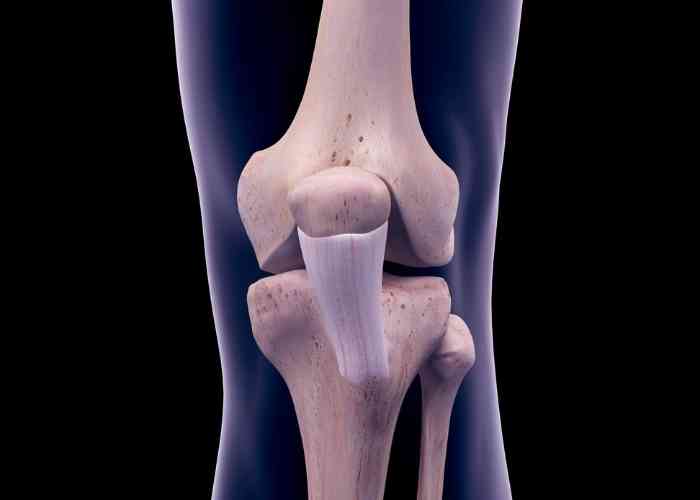MPFL Tear Specialist
Are you an athlete experiencing a recent knee injury resulting in frequent buckling, a deformity, or the feeling that the knee is out of place? If so, you may be experiencing a medial patellofemoral ligament (MPFL) injury. MPFL tear specialist Dr. Prem N. Ramkumar treats patients in Long Beach and from Los Angeles, and Orange County California who are experiencing painful symptoms from an MPFL injury. Contact Dr. Ramkumar’s team today!

What is a MPFL Tear or Medial Patellofemoral Ligament injury?
The patella (kneecap) is held in place on the distal femur (bottom of the thigh bone) by the medial patellofemoral ligament (MPFL). The ligament has an elastic-like quality, similar to a strong rubber band. The MPFL keeps the patella inside a groove called the trochlear groove. When the MPFL is injured, it stretches or tears, causing the kneecap to move too far laterally and sometimes dislocate. Dr. Prem N. Ramkumar, orthopedic knee specialist, treats patients in Long Beach and serves Los Angeles, Orange County, CA and surrounding areas for those who are experiencing the symptoms of a medial patellofemoral ligament injury.

How did I injure my Medial Patellofemoral Ligament (MPFL)?
Multiple factors can lead to MPFL injury, from genetics to individual anatomic variation to activity. If you play a sport that involves pivoting, such as tennis, basketball, or football, you’re more likely to injure your MPFL. Women tend to suffer more MPFL injuries due to loose ligaments. You can also suffer a medial patellofemoral ligament injury from a fall or a car accident. There are two types of MPFL injuries:
- Traumatic patellar dislocation: The patella has completely pushed out of the trochlear groove.
- Patella subluxation: The kneecap slides partially out of the trochlear groove and is easily dislocated.
What are the symptoms of a MPFL tear or Medial Patellofemoral Ligament injury?
If your knee doesn’t feel stable or you hear crackling sounds in your knee joint, you may have a medial patellofemoral ligament injury. Other symptoms include:
- A noticeable deformity in the knee
- Knee pain while sitting
- Kneecap pain after activity
- Stiffness
- Swelling
- Catching in the knee while bending or straightening the leg
How is an MPFL injury diagnosed?
Dr. Ramkumar typically can diagnose an MPFL injury with a physical exam. He will test your knee’s range of motion, stability, and strength. Be prepared to tell the doctor about any prior dislocations or subluxations. Pain on the outer aspect of the patella may also be an indication of injury to the MPFL. An MRI scan and X-rays can help determine the extent of the injury and if there is any additional damage to articular cartilage and other ligaments in the knee.
What is the Best Treatment for a Medial Patellofemoral Ligament tear?
The best treatment for a medial patellofemoral ligament injury depends on the severity of your case and if you have a history of kneecap dislocations or suffer from loose ligaments.
Non-surgical treatment
Many MPFL injuries can be treated successfully without surgery. If the injury minimally interferes with your daily life, Dr. Ramkumar will recommend conservative treatments such as:
- Rest
- NSAIDS (non-steroidal anti-inflammatory drugs)
- Knee Brace
- Physical Therapy
Surgery may be necessary if the above measures do not adequately manage your symptoms. If you have a history of kneecap dislocations or an underlying abnormality, there is a greater risk of requiring surgery.
Surgical Treatment:
Surgery for a medial patellofemoral ligament injury restores knee stability and range of motion so you can return to sports and other activities. Dr. Ramkumar will recommend one of the following procedures based on your individual case:
- MFPL Reconstruction: The most common treatment involves removing the damaged or torn ligament and reconstructing a new ligament
- Lateral Retinacular Lengthening: The fibrous tissue is released or lengthened on the outside of the knee to place the patella in a better position.
- Tibial Tubercle Osteotomy: The insertion point of the ligament on the tibia is moved to improve the alignment of the patella, usually in the case of an underlying abnormality.
It can take 6-9 months to recover fully from surgery to repair a medial patellofemoral ligament injury. Thankfully, surgeries to repair MPFL injuries have a high success rate, and recurrent dislocations are uncommon.

